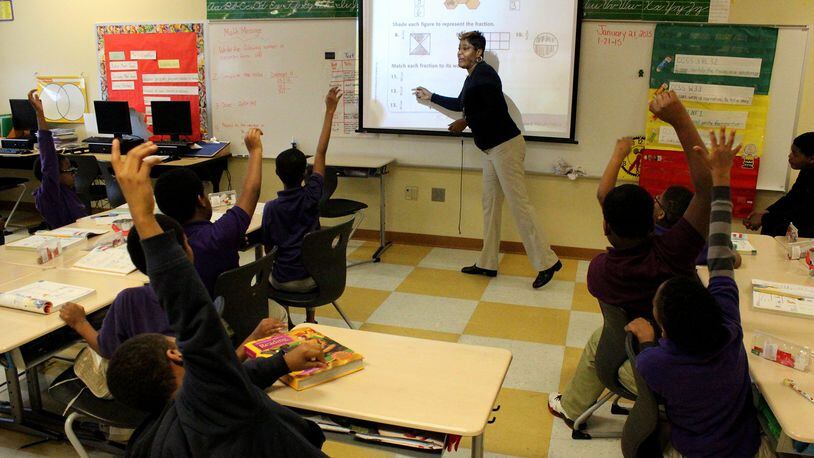Those schools that remained the emptiest in the new calculation are Wogaman (28 percent occupied), Boys Prep (29), Rosa Parks (32), EJ Brown (36), Meadowdale Elementary (37), Meadowdale High (43), World of Wonder (46) and Westwood (48).
EARLIER: Union urges DPS not to rush through closure study
DPS officials say the numbers changed because the district originally calculated a capacity of 30 students per classroom in all buildings, but has since changed that to 25 per classroom for the elementary schools, matching their budgeting process.
“I was concerned about these eight school buildings,” Associate Superintendent Shelia Burton said Friday. “I dropped (classroom size) to 25 students, and kept the (target) at 70 percent occupancy. … That criteria doesn’t change the concern that I have for those buildings.”
District leaders say no decisions have been made yet about which schools could close, or whether some buildings could be sold, combined or repurposed. Acting Superintendent Elizabeth Lolli on Tuesday called it a “guesstimate” that the district would close three buildings but said that number could be higher or lower.
RELATED: Key questions about low-enrolled Dayton schools
“There’s a lot at stake,” school board President Robert Walker said. “A lot of the community could be radically impacted. “We want to continue to be available to serve our students in the best way we can to ensure that they have a quality education available.”
School-by-school data
Tuesday was the first time the school board had been presented data on the “percentage of classroom space occupied” in each school. The numbers ranged from a low of 24 percent at Dayton Boys Prep to a high of 79 percent at Belmont High School.
This newspaper immediately requested a copy of the document under Ohio public records law, but the response we received two days later included a note from Burton that the report had been updated.
The new chart shows higher occupancy rates for all 18 of the district’s elementary schools — increases of 5 to 14 percentage points per school — while the numbers for the 10 middle schools and high schools are unchanged.
RELATED: DPS closed two schools in 2014, restructured another
Kiser and Valerie elementaries had been listed Tuesday at 69 and 68 percent occupancy, respectively, just below the district’s stated 70 percent target. But the updated chart showed them at 83 and 82 percent, the two most packed schools in Dayton.
Eight other schools, the majority in East Dayton, also showed occupancy rates at least 10 percentage points higher in the new document. No elementary school’s occupancy rate increased by less than 5 percent, and because of the changes, Wogaman Middle School, at 28 percent occupancy, moved from the third-lowest occupancy school to the emptiest of all.
Burton on Friday repeated that Tuesday’s numbers were a draft report that could have been calculated a variety of ways, and emphasized that a key piece of information stayed the same.
“The data that was shown to the board was to identify the lowest enrolled school buildings, and even when the numbers changed, (those schools) remained consistent,” Burton said.
RELATED: Superintendent’s pre-discipline hearing delayed
The change took Dayton Boys Prep from a listed capacity of 900 down to 750, and made Meadowdale Elementary’s capacity drop from 1,050 to 875.
Walker said the school board will look at “the real case for those schools” and make sure there is “a solid process in place,” so that as they analyze the data, they’ll be “working with hard numbers.”
“Like any research and analysis, you have to establish a baseline,” Walker said. “That’s what we’re looking for the administration to do for us, is to give us a baseline — a consistent baseline. And then we’ll allow the data to speak for itself.”
Busy upcoming weeks
A large crowd is likely when the school board meets Tuesday, with school closures a possibility and the discipline case of Superintendent Rhonda Corr still in limbo.
Lolli has said district leaders plan to meet with residents in January to discuss potential school closures and hope to make a recommendation to the school board before February.
Teachers union president David Romick said he would give the district the “benefit of the doubt” on the changes since Tuesday’s report to the board was presented as preliminary data. But he repeated concerns about the speed of the decision-making process and said the district should know how many students realistically fit in each building before making what he called “a huge decision.”
RELATED: Four new members elected to Dayton school board
Burton said Friday morning that the month-by-month timeline follows a blueprint from an education industry article on school closures.
UNMATCHED COVERAGE
The Dayton Daily News was first to explain Dayton’s school closure ideas Tuesday night, and is first to present this new data obtained via public records requests.
About the Author
